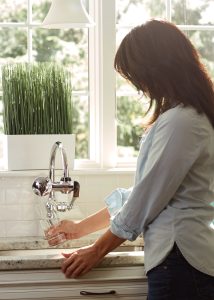 Find Out the Truth About Tap Water
Find Out the Truth About Tap Water
While the tap water you drink may look clean, it may contain harmful contaminants like lead, pesticides and industrial pollutants. These and others may be picked up on the journey from your water treatment plant through miles of pipes to your home.
To help clear up any misconceptions about what’s really in your water, the experts at PUR offer this myth-busting advice:
Myth: Living close to a fresh water source makes tap water safer to drink.
Truth: Even if you live close to a fresh water source, your water goes on a long journey through an often aging infrastructure before it reaches your tap. According to Environmental Health & Engineering, Inc., up to 10 million lead service lines are still in use in the country today, potentially allowing lead particles to enter into your water.
Myth: The Environmental Protection Agency (EPA) regulates all contaminants.
Truth: There are about 100,000 potential contaminants in drinking water. According to the EPA, its Safe Drinking Water Act only regulates 103. That means water that meets the government’s safe drinking standards may not meet yours.
Myth: All water filters are created equal.
Truth: While both pitcher and faucet filters remove unwanted contaminants, a faucet filter is usually a step up from a pitcher because it has a longer life and can remove even more contaminants, including lead. As every brand is different, it’s important to check the types of contaminants each filter removes and confirm it is certified by NSF and the Water Quality Association for contamination reduction. Doing so can help you get the healthiest, cleanest tasting water possible.
Myth: You can determine if tap water is safe to drink by how it looks, smells and tastes.
Truth: While your water might look, smell and taste clean, it could contain contaminants that are potentially harmful to your health, like lead, which is colorless, odorless and has no taste.
“Knowing what’s in the water you drink and cook with is important, but determining the quality of your local water supply can seem daunting,” said Keri Glassman, registered dietitian, nutritionist and PUR spokesperson. “Fortunately, there’s a free online resource called HYPERLINK “https://knowyourwater.pur.com/” KnowYourWater.com that allows users to type in any address to easily learn about lead and other possible contaminants in their water.”
Myth: Boiling water removes lead.
Truth: Boiling water may reduce bacteria found in the water, but will not remove lead. According to the Centers for Disease Control and Prevention, the lead concentration of water can actually increase slightly when water is boiled because some of the water evaporates during the boiling process.
Myth: Drinking filtered water is expensive.
Truth: Using a faucet filtration system for one year is comparable in cost to purchasing enough bottled water to last only two months. An option like the PUR Advanced Faucet Filtration System is an on-demand solution for filtered water right from the tap and is certified to reduce over 70 contaminants, including 99 percent of lead, 96 percent of mercury and 92 percent of certain pesticides.
Get your individual water quality report and learn more at KnowYourWater.com.
#14112
Source: PUR










